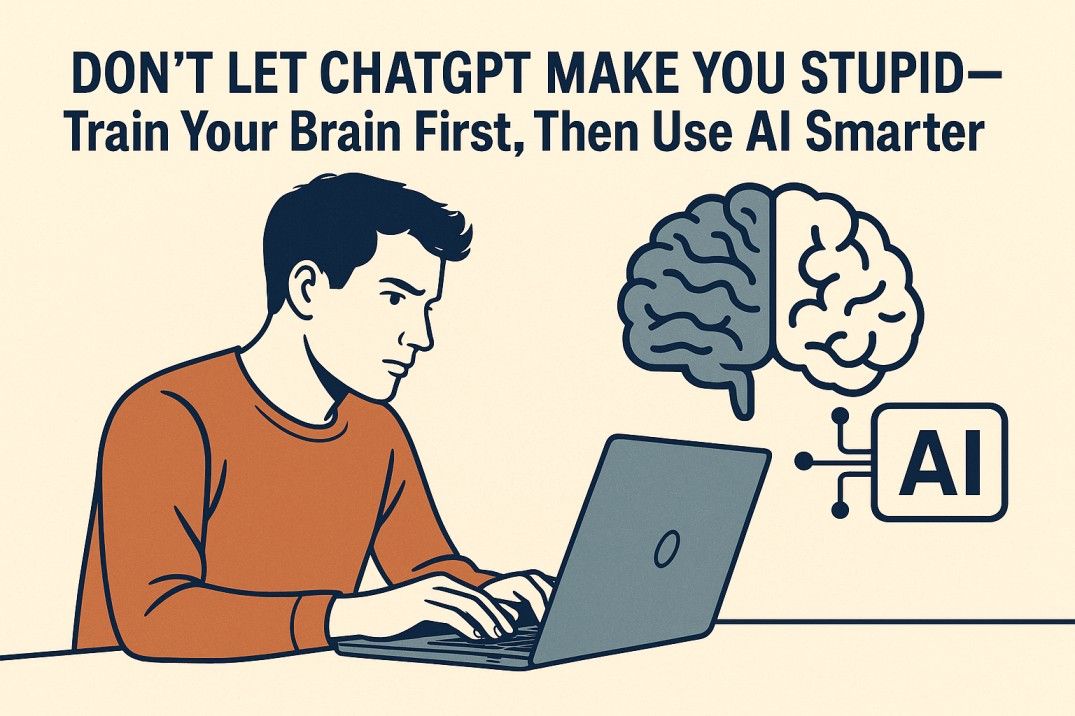Blogging2025-08-03
Don’t Let ChatGPT Make You Stupid – Train Your Brain First, Then Use AI Smarter

Written by Fernando Raymond
Founder & CEO SeekaHost™

By Fernando Raymond | Digital Entrepreneur | www.fernandoloves.com
We live in a time where answers are a prompt away. With tools like ChatGPT and other AI writing assistants, it’s tempting to outsource our thinking. I see it happening more and more: people don’t even try to write or think—they just prompt, copy, paste. Done.
And that, my friend, is a dangerous trap.
AI is incredible. I use it daily. But I use it with intention. I train, I write my first draft, I think hard, then I feed it to ChatGPT to polish or enhance what I’ve already created. That’s the key. You must use your brain first. Because if you don’t, you’re slowly switching off your most powerful asset.
Let’s break this down.
🧠 AI Can Weaken Cognitive Skills If You Don’t Use Your Brain
Neuroscience shows that cognitive strength—especially skills like problem solving, creative thinking, memory, and focus—improves with use and decays with neglect. It’s the “use it or lose it” rule. [1]
In a recent study by the University of Tokyo (2023), overreliance on AI tools for decision-making led to reduced activity in the prefrontal cortex—the area responsible for reasoning and judgment. [2]
That’s worrying.
If young users, students, or even professionals skip the hard part—thinking, brainstorming, outlining—and go straight to “AI, write me this,” they’re not engaging their cognitive muscles. Over time, this could lead to what I call “intellectual laziness.”
🤖 Generative AI Is Like a Calculator – Not a Substitute for Math
Let’s say someone says, “I can’t do maths,” but they’ve never actually sat down to try solving problems or learning equations. That’s not inability—it’s avoidance.
AI is just like a calculator. But calculators never made people bad at math—they only made people who never learned math worse.
According to a 2022 report by OECD, increased reliance on digital tools without foundational learning actually reduced problem-solving skills among school-age children. [3]
So, instead of asking, “ChatGPT, write my essay,” how about this:
Think deeply about the topic.
Write your rough version.
Then ask ChatGPT to improve your structure, refine your message, or fact-check you.
That way, you train your brain and still leverage AI for speed and finesse.
📉 The Cognitive Cost of Passive AI Use
A University of Gothenburg study (2023) tested students who wrote essays using AI versus those who didn’t. The AI group scored higher in grammar and clarity—but performed worse in comprehension tests related to their own writing. [4]
What does that mean?
They got a prettier result, but understood less of what they wrote.
That’s a recipe for shallow thinking. And in a world getting more complex, critical thinking is what separates successful people from the rest.
💡 Smart AI Use: How I Do It and What You Should Try
As a digital entrepreneur, I use ChatGPT like a smart assistant—not a crutch.
Here’s how I recommend using AI intelligently:
Feed it your ideas. Don’t ask for ideas unless you’ve tried brainstorming your own first.
Write a draft. Even if rough, write it yourself. You’ll grow as a thinker.
Use ChatGPT to polish, structure, and check. Make your writing better, but never let it be the original thinker.
Challenge its outputs. Ask “why?” or “can you explain that?” Don’t just accept—engage.
🧬 Brain Health Is Mental Fitness – And AI Should Be Your Gym Assistant
Your brain is plastic. That means it’s always changing—building or decaying—depending on how you use it. Young users especially need to develop their own knowledge systems, memory, attention span, and analytical skills.
A Harvard study found that attention spans are shrinking with increasing AI and smartphone use—especially in users under 30. [5]
But here’s the good news: AI can be your mental gym assistant, not your replacement. If you treat it that way, you’ll come out smarter, faster, sharper.
🧠 Future-Ready Humans: Thinkers + Doers + Creators
AI is here to stay. It’s part of our world. But the winners will not be those who rely on it blindly. The winners will be those who learn to think better than AI and then use AI to accelerate their output.
That’s what I’m doing.
That’s what I encourage all creators, entrepreneurs, writers, and learners to do.
So next time you want to use ChatGPT, stop and ask:
Have I thought about this myself?
Do I have a draft in mind?
Am I using this tool to sharpen my skills—or to avoid thinking?
Because your brain is still the most powerful AI you’ve got.
References:
“Use It or Lose It: The Aging Brain and How to Keep It Healthy.” – Harvard Medical School (2021)
“Artificial Intelligence and Human Judgment.” – University of Tokyo Neuroscience Report (2023)
“OECD Digital Education Report: Risks of Passive Learning” – OECD.org (2022)
“AI and Student Learning: A Comparative Study” – Gothenburg University Research Lab (2023)
“Attention in the Age of Distraction.” – Harvard Center for Digital Wellness (2022)
Final Thoughts
As someone who lives and works online, I know the lure of shortcuts. But I also know the power of a strong mind.
Feed your brain. Train your thinking. Then use ChatGPT as your ally—not your brain’s replacement.
– Fernando Raymond
Founder of ClickDo & SeekaHost | Blogger at www.fernandoloves.com

